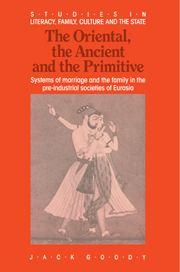 The Oriental, the Ancient and the Primitive
The Oriental, the Ancient and the Primitive Published online by Cambridge University Press: 09 January 2010
This chapter aims to deal with two main topics, one analytical, the other substantive. First, I want to look at how the analyses of marriage presented in the field studies of Fei and Hsu, which were carried out before the lineage became such a dominating concept in anthropology, should modify our view of the ‘exchange of women’ between lineages in Chinese society and how such lineages themselves differ substantially from the African model, at least in the South, in ways that are related to the workings of domestic groups.
The second, related, topic is how to reconcile or oppose the notions of the lineage in China with that of the conjugal fund, actual or potential, established at marriage, a fund whose existence is critical in the break-up not of the lineage itself, which has its own corporate estates, but of the residential, cooperative and property-owning groups that operate at the domestic level. In other words I want to examine the articulation of the agnatic lineage with the bilateral family, especially at the level of domestic groups.
Patriliny, widowhood and divorce
I have pointed to the difficulties that arise if we try to view Chinese or any other kinship institutions purely within the framework of patrilineal (or alternatively matrilineal) ties alone. For we then run into problems not only at the general level of the cognatic bonds generated in the elementary family (giving rise to what Fortes called ‘complementary filiation’) but also more specifically.
To save this book to your Kindle, first ensure [email protected] is added to your Approved Personal Document E-mail List under your Personal Document Settings on the Manage Your Content and Devices page of your Amazon account. Then enter the ‘name’ part of your Kindle email address below. Find out more about saving to your Kindle.
Note you can select to save to either the @free.kindle.com or @kindle.com variations. ‘@free.kindle.com’ emails are free but can only be saved to your device when it is connected to wi-fi. ‘@kindle.com’ emails can be delivered even when you are not connected to wi-fi, but note that service fees apply.
Find out more about the Kindle Personal Document Service.
To save content items to your account, please confirm that you agree to abide by our usage policies. If this is the first time you use this feature, you will be asked to authorise Cambridge Core to connect with your account. Find out more about saving content to Dropbox.
To save content items to your account, please confirm that you agree to abide by our usage policies. If this is the first time you use this feature, you will be asked to authorise Cambridge Core to connect with your account. Find out more about saving content to Google Drive.